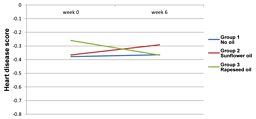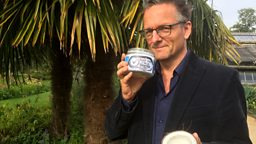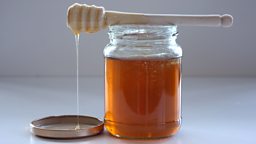Are oils ‘rich in polyunsaturates’ or ‘rich in monounsaturates’ good for me?
We know that . But what about other oils?

All vegetable oils are different – they have different ratios of saturated, monounsaturated and polyunsaturated fats. It is thought that saturated fats are bad for us, so replacing them with vegetable oils which have more unsaturated fats in them is generally thought to be a good thing (although care must be taken when cooking with oils – see ). However, that doesn’t mean to say that they are actively GOOD for us.
Olive oil, however, is now known to be good for our hearts. It is high in monounsaturates. So could all oils high in monounsaturates are equally good?
And oils high in polyunsaturates are said to lower our cholesterol – but does that mean they’re actually good for our hearts?
We teamed up with the University of Glasgow to carry out an experiment to find out.
Dr Bill Mullen and his team there have developed a new way of measuring subtle changes in heart health that can happen over only a few weeks, by looking at changes in the patterns of proteins excreted in peoples’ urine: a technique known as proteomics. The changes they are measuring are of the disease itself – which they can pick up before there are any physical symptoms, so it is far more accurate a method than measuring something that is just supposed to be associated with the disease, such as cholesterol levels.
The experiment
We recruited 75 volunteers from Glasgow, and asked them to give a urine sample. They were then randomly assigned to one of three groups:
Group 1 were our control group – they were given no oil at all, and asked to carry on life as normal.
Group 2 were given a 6 week supply of sunflower oil – high in polyunsaturates.
Group 3 were given a 6 week supply of rapeseed oil – high in monounsaturates (and with slightly fewer saturated fats than olive oil).
Groups 2 & 3 were asked to take 20ml (about 2 dessert spoons full) of their oil RAW (i.e. not used for cooking) each day.
It is very important that the oils were not used for cooking, as .
After 6 weeks, each volunteer gave another urine sample. Each urine sample was analysed for its protein ‘fingerprint’, getting a ‘score’ for the degree of heart disease that it indicated. The team calculated the average ‘score’ for each group at the beginning of the experiment, and after 6 weeks to see whether there was any improvement in their heart health.
Results
The results showed that none of the three groups showed any significant change in heart disease score over the 6 week period (by contrast with those taking olive oil in another experiment).

No group significantly improved in heart disease score (where -1 is completely healthy and +1 is symptomatic coronary artery disease) over the 6 week period.
Conclusions
In this experiment, there was no evidence that either rapeseed oil or sunflower oil improves heart health.
Since rapeseed oil has a similar level of monounsaturated fats to olive oil, it suggests that the benefits of olive oil are not down to its high monounsaturated fat content. And since sunflower oil is high in polyunsaturated fats, it suggests that these by themselves also do not have a beneficial effect on our hearts.
The team are continuing the experiment for a further 6 weeks to see whether an effect is seen in the longer term.





































































































